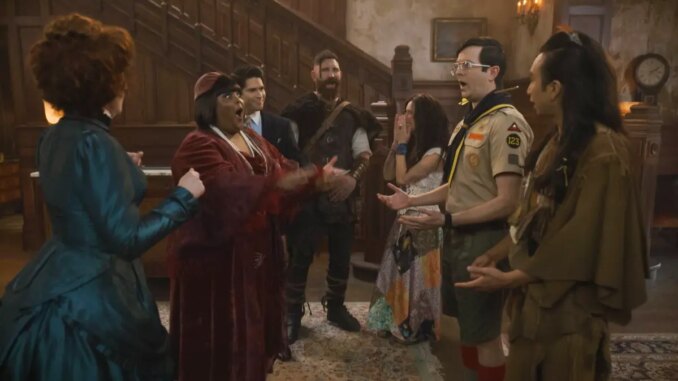
The Faustian Crossroads of Woodstone: Jay Faces the Devil’s Deal
The hallowed halls of Woodstone Manor, perpetually buzzing with the spectral symphony of its long-dead residents, are poised for a new kind of disturbance as Ghosts gears up for its fifth season. While Sam has long been the conduit between the living and the deceased, the latest "first look" tantalizingly hints at a different kind of burden falling upon her practical, grounded husband: Jay, facing what is ominously described as "the Devil’s Deal." This isn't merely a plot point; it's a thematic crossroads, illustrating the enduring conflict between ambition and integrity, the tangible and the ethereal, and the very soul of Woodstone itself.
From the outset, Jay has been the anchor to reality in Sam’s wonderfully unhinged world. He's the chef, the businessman, the one who grapples with the leaky pipes, the faulty wiring, and the ever-present financial tightrope walk of running a dilapidated B&B inhabited by a motley crew of demanding spirits. While Sam navigates the emotional intricacies of her ghostly found family, Jay often bears the weight of their collective earthly survival. It is precisely this practical, often exasperated, perspective that makes him so susceptible to the allure of a "Devil’s Deal." For Jay, the devil isn't necessarily a horned demon, but perhaps the gnawing anxiety of unpaid bills, the siren song of effortless success, or the relentless pressure to transform a charmingly chaotic money pit into a thriving enterprise.
Imagine the scenario: an investor with sleek suits and an even slicker proposal, promising to pump much-needed capital into Woodstone. Or perhaps a corporate entity offering to buy them out, an escape from the endless repairs and ghostly shenanigans. The deal, on its surface, would be undeniably attractive to a man who has poured his heart and dwindling savings into a venture that consistently defies conventional logic. This "first look" suggests a proposition so tempting, so seemingly perfect, that it forces Jay to confront his deepest desires for security and success, potentially at a cost that transcends mere money.
The illustrative power of this premise lies in the dual nature of the "deal." For Jay, it might offer financial salvation, a chance to prove his worth as a restaurateur, and finally, a semblance of normalcy. But for Woodstone, and by extension, its spectral inhabitants, it could be a death knell. A "devil’s deal" in the context of Ghosts implies a compromise that threatens the very essence of the manor: its historical integrity, its quirky charm, and most crucially, its ability to house the spirits who call it home. Would the deal demand renovations that erase centuries of history? Would it convert the B&B into a soulless corporate retreat, or worse, tear it down entirely?
The true illustrative weight of this storyline will be Jay’s internal struggle, the wrestling match between his practical desires and his burgeoning loyalty to a house full of dead people. He may not see the ghosts, but he has grown to love Woodstone through Sam's eyes and his own experiences with the house's inexplicable quirks. His previous skepticism has softened into a grudging, even affectionate, acceptance. This "devil's deal" will force him to confront the question: what is the true value of Woodstone? Is it the potential revenue it can generate, or the irreplaceable, intangible essence that makes it a home for Sam, for him, and for its unique, unseen residents?
Sam, of course, will be caught in the crossfire. Her love for Jay is undeniable, as is her profound connection to the ghosts. The "Devil’s Deal" will undoubtedly strain the foundational relationship of the show, forcing them to reconcile differing visions for their future and the future of Woodstone. The ghosts, themselves, will likely play an unwitting (or perhaps very witting) role, their quirks and needs highlighting the very things the deal threatens to extinguish. From Isaac’s historical grievances to Thorfinn’s primal need for a home, their individual stories become collective pleas for the preservation of their spectral sanctuary.
Ultimately, Jay's encounter with "the Devil’s Deal" is more than just a dramatic hook for Season 5; it’s a poignant exploration of what it means to be truly "living" in a world filled with the past. It illustrates the sacrifices we make for those we love, the battle between ambition and conscience, and the profound, often unexpected, value of a home that is truly unique – even if it’s haunted. As Jay stands at this crossroads, the heart of Woodstone, both living and dead, hangs in the balance, promising a season rich with humor, heart, and a very human dilemma amplified by the wonderfully whimsical chaos of its ghostly residents.